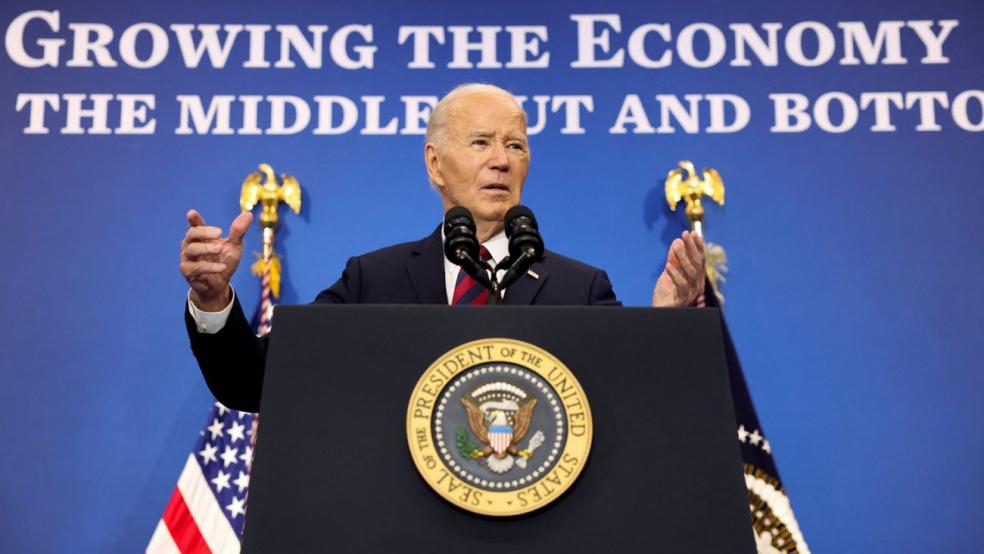President Joe Biden on Tuesday vigorously defended his economic record while warning that the policies proposed by his successor would be a “major mistake” that would harm American consumers.
In a speech at the Brookings Institution in Washington, D.C., Biden said his policies, focused on building “from the bottom up and the middle out,” have produced “the strongest economy in modern history.” The strength of the economy is particularly noticeable in comparison to other advanced nations, Biden said. “I don't know anybody [who] wouldn't change their economy for ours. Can you think of one, any major nation?”
Biden celebrated the recovery from the Covid-19 pandemic, which he attributed to the new economic course he laid out. “In four short years, we've come a long way ... from the crisis we inherited,” he said. “We not only beat the pandemic, we broke from the economic orthodoxy that's failed this nation, in my view, for a long time, a theory that led to fewer jobs, less economic growth and bigger deficits.”
Biden asserted that his focus on infrastructure, manufacturing and jobs is still paying dividends and will continue to deliver benefits if policymakers stay the course. “It was long past time for America to make a generational investment in our infrastructure, in our manufacturing base,” he said. “I know it’s been hard for many Americans to see, and I understand they’re just trying to figure out how to put three squares on the table. But I believe it was the right thing to do, not only to lift America out of economic crisis caused by a pandemic, but set America on a stronger course for the future.”
At the same time, Biden warned that the policies proposed by President-elect Donald Trump would undo much of the progress he believes the economy has made while driving up the deficit and forcing cuts to basic services like healthcare and veterans’ benefits. “By all accounts, the incoming administration is determined to return the country to another round of trickle-down economics and another tax cut for the very wealthy that will not be paid for, or if paid for, is going to have a real cost,” he said. “On top of that, he seems determined to impose steep, universal tariffs on all important goods brought into this country on the mistaken belief that foreign countries will bear the cost of those tariffs, rather than the American consumer.”
“I believe this approach is a major mistake,” Biden said.
In particular, Biden said he hoped that Trump would not follow the Project 2025 plan laid out by the Heritage Foundation for a radical restructuring and downsizing of government. “I pray to God the President-elect throws away Project 2025,” he said. “I think it’d be an economic disaster for us.”
One thing working in favor of sustaining his investments in infrastructure and manufacturing is the fact that so much of the spending is in Republican-led states, Biden said. “The historic investments we made went to more red states than blue states, not a politically smart thing to do,” he said. “And I knew what I was doing. I know people will be angry but the reason [is] the red states ... need it more.” He said he doubted that the Trump administration would ultimately pull the plug on new job-creating industrial investments, including a battery plant in North Carolina and a solar panel factory in Georgia.
“I believe the only way for presidents to lead America was to lead all of America,” Biden said. “And I believe the economy I'm leaving at the moment — and others could do better than I did, I'm not saying it was perfect — is the best economy, strongest economy in the world, and for all Americans, doing better.”
Final agenda: Although the president spent much of his speech looking back at his four years in office, White House Chief of Staff Jeff Zients reminded everyone this week that the Biden administration still has more than a month to go — and an agenda it wants to accomplish.
In a memo Monday, Zients reportedly told White House staff that in its final 42 days, the administration plans to provide another round of student debt forgiveness, work toward a ceasefire in Gaza, provide more military aid to Ukraine and push Congress to provide disaster relief. He also noted that the $2,000 cap on prescription drug costs will go into effect for all Medicare participants starting in January.
“There’s so much more we’re working on — we have announcements to come on everything from climate to conservation to AI [artificial intelligence] and more,” Zients said. “I know you and your teams are pushing forward on every issue, yard by yard. Thank you for making the most of this final 42-day sprint.”




